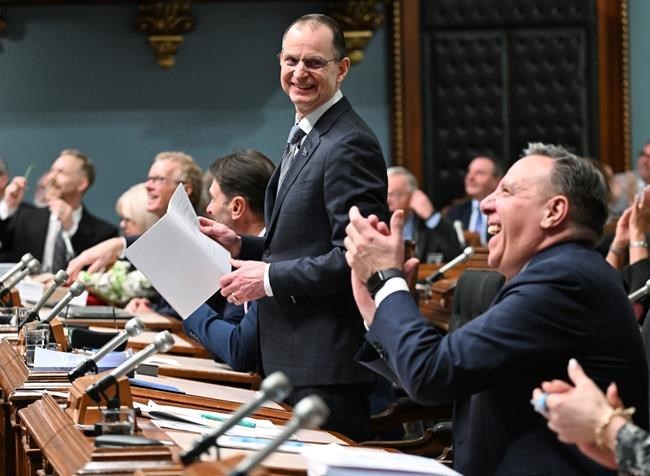QUEBEC — A stagnant economy, a historic forest fire season and billions of dollars in public sector wage increases are what Quebec’s finance minister says have led to one of the biggest budget deficits in the province’s history.
After hinting for weeks that Quebec’s financial situation was weak, Eric Girard tabled a $158-billion budget on Tuesday with an $11-billion deficit and a delay of his timeline to balance the books.
Quebec’s economy is so bad that the budget for the 2024-25 fiscal year doesn’t include details about how and when the province’s finances will return to balance — that will only come next year, he said. Girard would only commit on Tuesday to balancing the budget by the 2029-30 fiscal year — two years later than he had forecast 12 months ago.
Quebecers will have to wait for the government’s plan to erase the deficit, he said, because “we think the economic conditions will be better next year.”
The province’s real GDP — adjusted for inflation — grew by 0.2 per cent in 2023, and the budget predicts it will increase by 0.6 per cent in 2024 and by 1.6 per cent in 2025.
“The economy is currently stopped,” Girard told reporters in Quebec City, adding that if the Bank of Canada cuts interest rates — something he said he expects in the second half of 2024 — then growth will accelerate. “If there’s rain this summer, if there’s water in Hydro-Québec’s reservoirs, if (electricity) exports restart,” he said, he’ll be in a better position to figure out when and how the books will eventually be balanced.
Aside from the sluggish economy, Girard says the province’s revenues took a hit from dry weather conditions last summer, which led to a historic fire season and reduced water levels in the electric utility’s reservoirs, leaving the provincially run corporation with less power to sell. In its annual report earlier this year, Hydro-Québec said its annual dividend to the provincial government dropped to $2.5 billion in 2023, from $3.3 billion the year before.
As well, Girard said, strikes in the public sector — which for weeks last year shut down schools and delayed surgeries — resulted in salary increases that added $3 billion in annual expenses.
Eleven billion dollars, he admitted, could be the largest deficit ever recorded in Quebec. However, he said, governments in the 1990s recorded bigger deficits as a percentage of the province’s GDP. In the 2020-21 fiscal year, at the height of the COVID-19 pandemic, government spending exceeded revenues by $10.7 billion, he said.
“Here, we’re at $11 billion, but obviously it’s a forecast,” he said about Tuesday’s budget, adding: “It could be the highest deficit in terms of dollars.”
The $11-billion figure includes a $1.5-billion contingency reserve and a $2.2-billion, legally required transfer into a fund dedicated to reducing debt.
Quebec will collect $150.3 billion in revenue, an increase of 2.4 per cent, and it plans to spend $157.6 billion in the 2024-25 fiscal year, an increase of 4.4 per cent. The budget includes $8.8 billion in new spending, with almost $5 billion going to health and education, sectors that Girard described as priorities for the government.
And while the province plans to spend billions of dollars more than it will take in this fiscal year, Girard has released a plan to find $2.9 billion in savings over the next five years.
That plan includes savings of $1 billion by reducing corporate subsidies, including by changing the wage-based tax credit for jobs in the IT and video game sectors. The new rules lift caps on the amount of salary eligible for the tax credits, which will be targeted more toward “highly specialized well-paying jobs” in those industries, the budget says.
Girard said the government will also require provincially owned companies — such as Hydro-Québec and the liquor board — to find hundreds of millions in savings. The province also plans to hike the tobacco tax and collect more money from tax cheats.
The Liberal Opposition was quick to describe Tuesday’s budget deficit as a “record.”
When the Liberals left office in 2018, Quebec had a roughly $7-billion surplus, boasted Frédéric Beauchemin, the party's finance critic. “Now we have a deficit of $11 billion — that’s an $18-billion gap in six years,” he told reporters. “It’s a terrible management of resources.”
The Coalition Avenir Québec government, he said, “has lost control of public finances. The CAQ doesn’t know how to create wealth. The CAQ is hurting the productivity of our companies. There is no plan to return to a balanced budget.”
Quebec’s net debt is projected to rise from $221.1 billion to $237.8 billion, an increase of $16.64 billion, when capital investments are included. That would make the debt the second highest among provinces as a percentage of GDP, after Newfoundland and Labrador.
This report by The Canadian Press was first published March 12, 2024.
Jacob Serebrin, The Canadian Press




